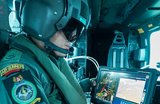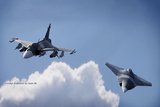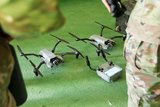US denies role as Venezuela's Maduro blames 'assassination' attempt on Colombia
The United States has denied involvement as Nicolas Maduro blamed the opposition and Colombian counterpart Juan Manuel Santos for an alleged 'assassination' attempt on the Venezuela president.
Venezuela's far-left government said seven soldiers were wounded by the alleged attack using explosive-laden drones during a military parade in Caracas on 4 August.
Maduro pointed the finger at outgoing Colombian President Santos and 'the ultra-right wing', a term he uses to describe domestic opposition, as a mysterious rebel group claimed responsibility.
US national security advisor John Bolton on 5 August insisted there was 'no US government involvement' and even suggested that the incident could have been 'a pretext set up by the regime itself.'
Venezuela has already reacted with a series of arrests as Attorney General Tarek William Saab, who was also present at the parade, warning: 'There will be a ruthless punishment.'
Saab said the names of those arrested would be revealed on 6 August.
State television images showed Maduro looking up disconcertedly in the middle of a speech, having heard a bang, before members of the country's National Guard lined up in the parade suddenly scattered.
Communication Minister Jorge Rodriguez said there was 'an explosive charge... detonated close to the presidential podium' and in several other spots along the parade held in central Caracas. Saab told CNN he saw a drone filming the event explode.
No drones could be seen in the television broadcast, which showed bodyguards jumping in front of Maduro to protect him with flexible ballistic shields. The broadcast was quickly cut.
Meanwhile, a policeman who requested anonymity told AFP that drones may have been released from a nearby apartment that suffered a fire after one exploded. However, other accounts attributed the fire to the accidental explosion of a gas cylinder.
Late on 4 August a civilian and military rebel group calling itself the 'National Movement of Soldiers in T-shirts' claimed responsibility in a statement passed to US-based opposition journalist Patricia Poleo.
'We cannot tolerate that the population is suffering from hunger, that the sick do not have medicine, that the currency has no value, or that the education system neither educates nor teaches, only indoctrinating communism,' said the statement, accusing the regime of having 'made public office an obscene way to get rich.'
Maduro, though, blamed neighboring Colombia: 'I have no doubt that the name Juan Manuel Santos is behind this attack.'
Santos, a Nobel Peace Prize winner who negotiated a historic peace accord with Marxist guerrillas FARC, is due to hand over power to the hardline right-wing Ivan Duque, a vocal critic of Venezuela's regime, on 7 August.
The Colombian foreign ministry denied involvement, saying the allegations were 'absurd' and 'lacked any foundation.'
Maduro said investigations pointed to financial backers who 'live in the United States, in the state of Florida. I hope that President Donald Trump is ready to fight these terrorist groups.'
More from Defence Notes
-
![Why small guns have been critical to layered CUAS architectures]()
Why small guns have been critical to layered CUAS architectures
Multiple countries have been deploying small arms as the last line of drone defence due to their multiple operational and tactical advantages.
-
![Singapore Airshow 2026: ST Engineering hints at export success for AME assault rifle family]()
Singapore Airshow 2026: ST Engineering hints at export success for AME assault rifle family
The Singapore-based technology company unveiled its new rifle family at this week’s airshow. Chen Chuanren spoke with the ST Engineering’s head of small arms to find out more about how the weapons have been refined.
-
![High tension in the High North – a wake-up call for NATO’s future Arctic defence efforts?]()
High tension in the High North – a wake-up call for NATO’s future Arctic defence efforts?
Any potential ‘Arctic Sentry’ mission would be months in the planning, but with tensions high in the region given the US’s push for Greenland, NATO countries will need to continue to emphasise their commitment to the region, analysts have said.
-
![Venezuela prepares personnel and equipment for a potential second US attack]()
Venezuela prepares personnel and equipment for a potential second US attack
Defence Minister Gen Vladimir Padrino López has declared that the Venezuelan armed forces “will continue to employ all its available capabilities for military defence”.
-
![As the new year starts, the UK defence spending delay continues]()
As the new year starts, the UK defence spending delay continues
The UK’s defence spending commitments remain uncertain as the government’s Defence Investment Plan, which had been due by the end of 2025, is yet to be published.
-
![How might European countries look to tackle drone incursions?]()
How might European countries look to tackle drone incursions?
Disruption of infrastructure in Europe, whether by cyberattack, physical damage to pipelines or uncrewed aerial vehicles flying over major airports, as has happened more recently, is on the rise. What is the most effective way of countering the aerial aspect of this not-so-open warfare?


























